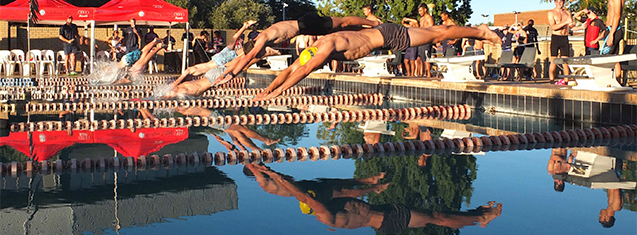
Photo: Albert van Biljon
Boys’ roars and ladies’ shouts could be heard from miles away. From this, one could tell that the 2015 first-year’s Swimming Gala was bound to be an exciting one.
While RC Sports members were stressing, the first-years blissfully continued in song and excitement.
One would think that, after a hectic first week of classes, first-years would not have much energy left, but the atmosphere proved that Residence Committees (RCs) had prepared the individuals with rather motivating pep talks before the event. Most male residences put their best foot forward, not holding back on themed attire and additional instruments, while female residences sang and danced to the music provided. Not only were the masses competing to claim that they had the greatest spirit on this night, but they were also waiting to hear the results of the Spirit Cup for the first-years’ Athletics, which was cut short due to heavy rain showers. This simply added to the already intense anticipation of first-years and RC Sports members, as they would receive the results only at the end of the event.
The competition was tough as many of the first-years who competed moved with ease in the water as though it was second nature to them. This year’s gala saw quite a few talented, national swimmers competing, which left those who swam for pride and points intimidated. The excitement of the crowd was heightened as the relay section of the programme approached. This meant that the winners were to be announced soon.
In the ladies’ section, the residences were placed:
• 1st – Marjolein
• 2nd – Wag-‘n-Bietjie
• 3rd – Sonnedou
In the men’s section, the residences were placed:
• 1st – Armentum
• 2nd – Vishuis
• 3rd – Karee
When the time arrived for the announcement of the Spirit Cup winners, many were hopefully clenching their hearts for their name to be roared out. In most people’s opinion, it came as no surprise when Armentum walked away with the Spirit Cup for both the first-years’ Athletics and the Swimming Gala. Furthermore, Armentum’s broader South College community – of which Emily Hobhouse, Marjolein, NJ vd Merwe and Villa Bravado are also part – walked away with the cash prize for the best mascot.
By end of the night, everyone, no matter if they were drenched or dry, experienced the exciting sporting atmosphere at Kovsies that they’ve now become a part of.